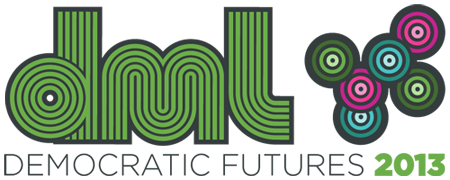21C: Make, Do, Engage: Hacker Literacies and Civic Participation
The rigorous and compelling work of thinkers such as Jenkins, Papert & Harel, and Kafai have made commonplace the notion that participation is a fundamental modality for 21st century learning. Crafting narratives, designing games--generally making things that reflect one’s own interests and curiosities--allows learners to express their understanding in a form that, for example, might be material, could be shared with others, or allows for interaction with others’ creations. In parallel, the Knight Commission (2009, p.i) has recently reported that “people with digital tools and skill have distinct political, social and economic advantage over those without them.” This assertion has been supported in a number of empirical research studies for instance addressing the digital divide (e.g., Livingstone, Van Couvering, Thumim, N., 2005; Hargittai, & Walejko, 2008; Hargittai, 2010).
This panel investigates the convergence of participatory acumen and civic activity by focusing on the concept of “hacker literacies”-- how this construct might be defined, how it might be researched “in the wild,” and how learning interventions can being designed to cultivate it. We distinguish hacker literacies from digital literacies by their emphasis on making and building within a sociotechnical domain, including learner acquisitiveness, creativity, collaborative negotiation and technical implementation skills. The panel’s four speakers will consider the ways in which the practices that are being discovered as integral to hacker literacies could produce qualities in individuals, groups, and communities that engender new forms of civic participation.
Each presenter will focus on a case study or set of ideas that help to explicate the construct of hacker literacy. Rafi Santo, doctoral candidate in learning sciences at Indiana University, will build on his work conceptualizing hacker literacies as a synthesis of critical and new literacies frameworks (Santo, 2011). Rebecca Reynolds, Assistant Professor of Library and Information Science at Rutgers University, will discuss linkages to the concept “hacker literacies” that exist within a framework of “6 contemporary learning abilities” she and a co-author have developed (Reynolds & Wolf, in review) to incorporate the concept “Constructionist digital literacy” in the context of a school-based game design program called Globaloria. She will also highlight the program’s approach to integrating civics core curricular objectives into game design at some schools, and discuss some key findings to-date involving motivation to learn. Chris Hoadley, Associate Professor of Educational Technology at New York University, will discuss the role of indigenous design to allow capacity building for self-determination at the local and national levels based on his work in South Asia (Hoadley, 2011; Hoadley, Honwad, & Tamminga, 2010). Ingrid Erickson, also an Assistant Professor at Rutgers, will discuss the ways that the larger maker community helps to shape and instantiate hacker literacies in practice through events such as Maker Faires and in places such as hacker spaces. The session will conclude by drawing forth synergies from each presentation to prompt discussion and engender deeper consideration of how to promote hacker literacies within the greater DML community.



